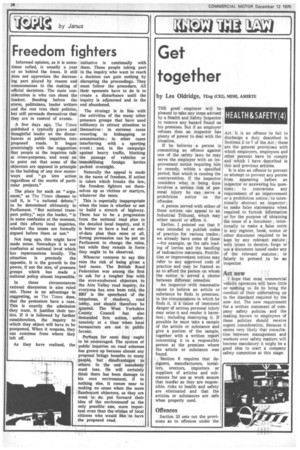Get together
Page 32

If you've noticed an error in this article please click here to report it so we can fix it.
by Les Oldridge, TEng (CEO, MIMI, A111RTE
THE good employer will be pleased to take any steps advised by a Health and Safety Inspector to remove any hazard found on his premises. But if an employer refuses then an inspector has plenty of power to deal with the situation.
If he believes a person is committing an offence against one of the safety laws he may serve the employer with an improvement notice requiring him to remedy, within a specified period, that which is causing the contravention. If the inspector considers what is being done involves a serious risk of personal injury he can serve a prohibition notice on the offender.
A person served with either of these notices can appeal to an Industrial Tribunal, which may either cancel or affirm it.
Earlier, I pointed out that it was intended to publish codes of practice for various trades ; we already have some of these 7--for example, on the safe loading of lorries and the handling of radioactive materials, Prohibition or improvement notices may refer to any approved code of practice and may be framed so , as to afford the person on whom ' the notice is served a choice between different remedies.
An inspector with reasonable cause to believe an article or substance he finds in premises, in the circumstances In which he finds it, is a cause of imminent danger of serious personal injury may seize it and render it harmless ; including destroying it. If possible he must take a sample of the article or substance and give a portion of the sample, together with a written report concerning it to a responsible person at the premises where the article or substance was found.
Section 6 requires that de signers, manufacturers, instal• lers, erectors, importers or suppliers of articles and sub stances for use at work ensure that insofar as they are respon sible, risks to health and safety are eliminated and that the articles or substances are safe when properly used.
Offences
Section 33 sets out the provisions as to offences under the Act. It is an offence to fail to discharge a duty described in Sections 2 to 7 of the Act ; these are the general provisions with which employers, employees and other persons have to comply and which I have described in this and previous articles.
It is also an offence to prevent or attempt to prevent any person from appearing before an inspector or answering his questions; •to contravene any requirement of an improvement or a prohibition notice ; to intentionally obstruct an inspector ; to make false statements when required to furnish information or for the purpose of obtaining the issue of a document ; intentionally to make a false entry in any register, book, notice or other document required to be kept by any relevant statute ; with intent to deceive, forge or' use a document issued under any of the relevant statutes ; or falsely to pretend to be an inspector.
Act now
I hope that most commercial vehicle operators will have little or nothing to do to bring the conduct of their undertaking up to the standard required by the new Act. The new requirement for a written statement of company safety policies and the making known to employees of these policies should receive urgent consideration. Because it seems very likely that consultation between management and workers over safety matters will become mandatory it might be a good idea to start a company safety committee at this stage.














































































